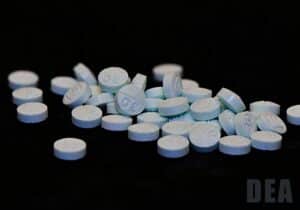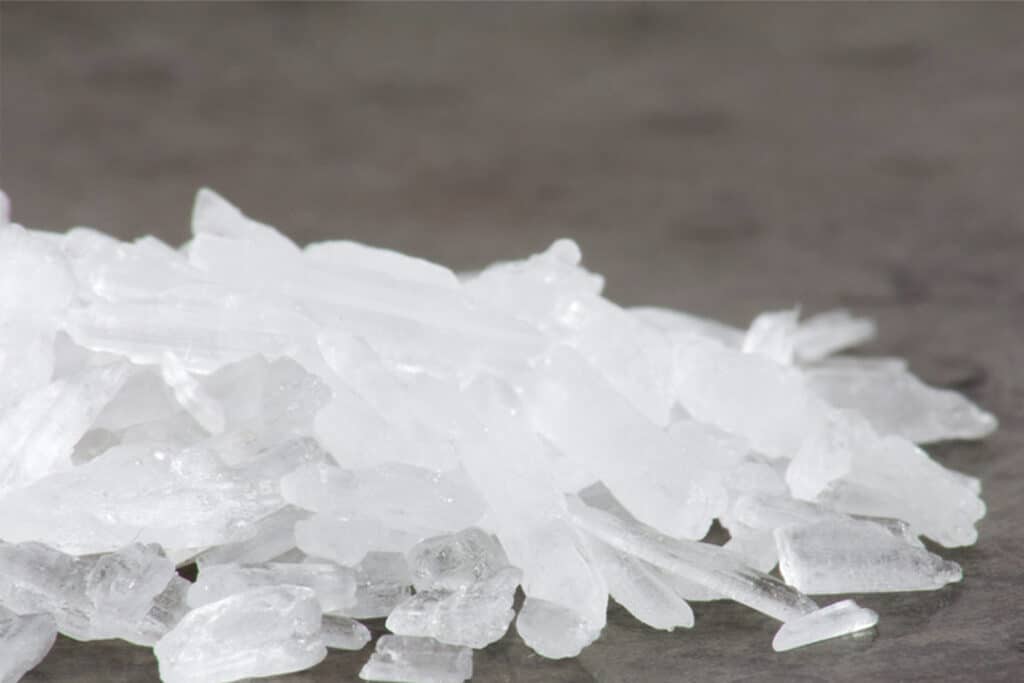Table of Contents
What is Crystal Meth
Methamphetamine, commonly referred to as “crystal meth,” is a powerful synthetic psychostimulant with a deep-seated impact on the central nervous system. Known by various street names such as “crystal,” “speed,” and “Tina,” its misuse, especially in its illicit form, presents grave challenges. Highlighted by MethProject.org, meth stands out as one of the most addictive substances today.
Initially developed from amphetamine for medical purposes in the early 20th century, meth’s transition to the streets has amplified addiction issues. The National Survey on Drug Use and Health reveals that over 2 million Americans, aged 12 or older, consumed methamphetamine in the past year, solidifying its status among illicit stimulants.
Meth’s dangers are twofold, causing both physical and emotional devastation. Users often chase its ephemeral high, consuming more frequently, which can culminate in extended binges.
Recognizing the pervasive threats posed by meth, Iris Wellness Group, is dedicated to providing comprehensive meth rehab in Chattanooga, Tennessee. Our meth addiction treatment approach is both effective and rooted in compassion, aiming for a brighter, drug-free future for all our clients.
Is Meth Addictive?
Methamphetamine, commonly known as meth, is highly addictive. Its addictive nature is due to its powerful stimulant effects on the brain, rapidly inducing feelings of euphoria and increased energy. Meth alters brain chemistry, leading to intense cravings and compulsive drug-seeking behavior. Even after short-term use, individuals can develop a strong psychological dependence on meth, making it one of the most dangerous and addictive substances available.
Why is Meth so Addictive?
Meth, like its amphetamine counterparts, boosts activity, reduces hunger, promotes sociability, and can create feelings of joy and contentment. However, meth distinguishes itself by entering the brain in larger quantities than a comparable dose of amphetamines, making it a stronger stimulant.
When smoked or injected, the drug’s effects are almost immediate, leading to a rapid and powerful, albeit brief, surge. In contrast, snorting or consuming meth results in euphoria within minutes, but without the same intensity.
While its enjoyable effects persist longer than those of cocaine, they are still relatively short-lived. As a result, users often consume more meth to prolong the sensation, sometimes neglecting basic needs like food and rest in a days-long drug binge.
Consumption of meth triggers a spike in dopamine, a crucial neurotransmitter linked to motivation and the sense of reward.
How Is Meth Addictive?
Methamphetamine becomes addictive through its interaction with the brain’s dopamine system. It causes an excessive release of dopamine, leading to intense euphoria and a heightened sense of alertness. This effect can quickly lead to psychological dependence, as the brain becomes accustomed to these high levels of dopamine and begins to rely on meth use to sustain them, leading to addiction.
How Addictive Is Meth?
Methamphetamine is one of the most addictive substances known. Its ability to rapidly produce intense euphoria and a sense of heightened alertness makes it highly addictive. Many users develop a dependency after just a few uses, as the drug’s powerful effects on the brain’s reward system create a compelling urge to continue using.
How Long Does It Take to Get Addicted to Meth?
The time it takes to become addicted to meth can vary, but due to its potent effects, addiction can develop quickly, sometimes within a few uses. The risk of addiction increases with frequent and higher doses. Some individuals may become addicted after short-term use, while others may develop addiction over a longer period of regular use.
Is Meth Physically Addictive?
While methamphetamine is primarily known for its psychological addiction, it can also lead to physical dependence. Long-term or heavy use of meth can result in physical withdrawal symptoms when usage is reduced or stopped, indicating physical addiction. These symptoms can include fatigue, increased appetite, depression, and sleep disturbances.
Is There a Cure for Meth Addiction?
While there isn’t a swift or simple solution to meth abuse/addiction, it is possible to address substance use disorders through both physical and psychological interventions. Options for meth addiction treatment encompass medically guided detox, residential addiction care, partial hospitalization, intensive outpatient programs, outpatient rehabilitation, and measures to prevent relapse.

Signs and Symptoms of Meth Addiction:
Methamphetamine addiction manifests in various physical, emotional, and behavioral symptoms. Recognizing these signs is critical for early intervention and treatment. Common symptoms and side effects include:
- Elevated body temperature and heart rate.
- Skin issues like scabs, scars, and incessant itching.
- Severe tooth decay, commonly referred to as “meth mouth.”
- Drastic mood swings, encompassing outbursts of anger, aggression, and even violence.
- Fluctuations in energy, including staying awake for days on end.
- Decreased appetite, which can result from meth’s impact on the brain’s serotonin levels.
- Significant weight loss.
- Restlessness, distractibility, and obsessive physical activity.
- Increased sexual activity, paired with heightened sensitivity to noise.
- Racing thoughts and excessive talkativeness.
- Neglect of personal appearance and hygiene.
- Disinterest in work, school, and hobbies.
- Symptoms of psychosis, such as paranoia, anxiety, and even episodes of euphoria.
- Physical symptoms like tremors, convulsions, dry mouth, dilated pupils, rapid eye.
- movement, and visible wounds from injections, often termed “speed bumps.”
- Elevated blood pressure, risk of stroke, and irregular heartbeats.
- Risk of contracting HIV/AIDS from shared injection equipment.
Moreover, if someone is suspected of meth use, there are tell-tale signs associated with meth paraphernalia, such as water pipes, burned spoons, aluminum foil, rolled paper slips, needles, syringes, and items like shoelaces or rubber tubing used for injections. Recognizing these signs can be the first step towards seeking effective meth addiction treatment and rehab.
Meth paraphernalia, additional signs of usage includes:
- Liquid-conveying devices like water pipes
- Charred spoons
- Pieces of aluminum foil
- Folded strips of paper
- Injection-related items such as needles, syringes, along with accessories like shoelaces and rubber tubes for tourniquet purposes during intravenous application.
What is Tweaking
Tweaking is a result of abuse and binge behavior that is unique to meth use disorder because the effects of the meth high only last for a short duration. The duration of the high becomes even shorter the longer a person has been abusing the substance.
This regularly leads to extended abuse that exacerbates many of these symptoms. The most well-recognized sign of tweaking is extended insomnia, which could last a few days to a couple of weeks. The lack of sleep then makes other effects worse, from paranoia and irritability to physical reactions like rapid eye movement and fast, garbled speech.
Long-Term Effects of Meth Use and Addiction
The profound long-term effects of meth use cannot be understated. The NIDA points out that crystal meth can wreak havoc on nerve endings and heighten the risk of both physical and psychological disorders, including Parkinson’s disease. Chronic meth consumption can inflict lasting harm on the brain’s blood vessels. Furthermore, this drug is linked to birth anomalies, significant weight reduction, and a myriad of cardiovascular complications like arrhythmia, heart attacks, strokes, and seizures. The detrimental consequences extend to severe weight loss and even fatality. Methamphetamine addiction compounds these issues, adding its own set of dangers.
Prolonged meth use not only fosters dependency and addiction but also has detrimental implications for one’s overall health. The drug induces long-standing alterations in the brain, some of which might be only partially reversible. Chronic users might experience:
- Anxiety.
- Heart-related complications, including heart attacks, irregular heartbeats, palpitations, and sudden cardiac arrest.
- Neuronal damage.
- Severe malnutrition and weight loss.
- Elevated risks of stroke and Parkinson’s disease.
- Respiratory problems, including chronic cough and bronchitis, especially in those smoking meth.
- Severe dental complications, encompassing gum diseases and tooth decay.
- Memory impairments.
- Erratic mood fluctuations.
- Nasal issues, like irritations and nosebleeds, predominantly in those snorting meth.
- Seizure episodes.
- Skin sores.
- For injectors, visible “track marks” and a heightened risk of HIV and hepatitis.
- Insomnia.
- Propensity for violent or aggressive actions.
How Long Does Meth Stay in Your System?
Methamphetamine can stay in the system for varying durations. It is detectable in blood for 1 to 3 days and in urine for 3 to 6 days after use. However, meth can be detected in hair for up to 90 days. The duration depends on factors like the amount used, frequency of use, and individual metabolism.
Begin Your Meth Addiciton Treatment Today!
What Happens During Meth Addiction Treatment?
Every individual grappling with meth addiction has distinct needs, aspirations, and hopes for their recovery journey. Therefore, the course of meth addiction treatment can differ for each individual.
Broadly, the core objectives of meth addiction treatment encompass:
- Assisting the individual to cease meth consumption.
- Equipping the individual with tools and strategies for lasting recovery from meth addiction.
- Addressing any concurrent mental health issues affecting the individual.
Achievement of these objectives might involve a combination of medications, therapeutic sessions, educational initiatives, and supplementary supportive services.
The foundation of effective treatment is a comprehensive evaluation. This step enables the treatment professionals to discern the entirety of the individual’s requirements. The insights derived from this assessment shape the tailor-made treatment strategy.
Based on the assessment findings, the treatment team can also deduce the most appropriate care level for the individual. For instance, at Iris Wellness Group in Chattanooga, we extend a range of meth addiction treatment services, such as:
- Partial Hospitalization Program (PHP)
- Intensive Outpatient Program (IOP)
- Adolescent IOP
- Outpatient Rehab
Depending on the individual’s unique requirements and their selected care level, their specialized meth addiction treatment regimen might encompass components like:
- Individual and group therapeutic sessions
- Therapeutic support for families
- Cognitive-behavioral therapy techniques
- Trauma-focused therapeutic interventions
- Brainspotting therapy sessions
- Neurofeedback therapeutic approaches
- Holistic therapeutic modalities
- Medication oversight and regulation
Upon the culmination of meth addiction treatment at our Tennessee facility, every individual is endowed with an exhaustive aftercare strategy before they venture beyond our premises. This strategy offers insights regarding professional aid and localized resources that can bolster their recovery in the subsequent weeks, months, and even years.
Does Insurance Cover Meth Addiction Treatment?
Yes, numerous meth rehab facilities accommodate both in-state and out-of-state insurance policies. To determine if your insurance might cover all or a portion of your treatment expenses, you can submit your insurance details through our verify insurance form or call 423-564-6114 and an admissions representative from Iris Wellness Group will then review your benefits.
How Long Does Meth Addiction Treatment Last?
The duration a person spends in a program hinges on individual needs, aspirations, and their recovery journey. Several factors, such as the duration of the meth addiction, the quantity abused, the intensity of their withdrawal symptoms, and any co-existing mental health issues, play pivotal roles in determining the length of their stay.
For some, a singular level of care, like residential treatment or a partial hospitalization program, might suffice. However, others might transition to intensive outpatient or standard outpatient rehab for continued support post the completion of a more intensive care phase.
Ultimately, every decision related to meth addiction treatment circles back to one central question: “What’s in the best interest of the individual undergoing treatment?” The answer to this shapes the choice of the treatment facility, the level of care, the array of services offered, and the overall duration of the treatment process.

Find Meth Addiction Treatment in Chattanooga
Iris Wellness Group provides a comprehensive range of tailored programs for individuals grappling with meth addiction. At our Chattanooga, Tennessee center, we pride ourselves on our evidence-backed therapeutic approaches, a variety of care levels, specialized services for those with concurrent mental health challenges, and in-depth post-care planning to ensure ongoing recovery. Don’t let meth addiction claim another moment of your life. Call us today to discover the ways we can assist you and to understand our admission procedures.
Meth Frequently Asked Questions
What Does Methamphetamine Look Like?
Methamphetamine commonly appears as a white, odorless, bitter-tasting crystalline powder that dissolves easily in water or alcohol. Another form, known as crystal meth, resembles bluish-white rocks or shards and is often smoked. The appearance can vary, especially with illicitly manufactured meth, which may contain impurities affecting its color and texture. Recognizing its various forms is crucial in identifying and addressing methamphetamine abuse.
How Long Do Methamphetamines Stay in Your System?
Methamphetamines can remain in the system for varying durations. Typically, they are detectable in urine for 3 to 6 days and in blood for 1 to 3 days after use. In hair, meth can be detected for up to 90 days. These durations can vary based on factors like the amount used, frequency of use, individual metabolism, and overall health of the user, making it a complex substance to trace.
How Long Does Meth Stay in Urine?
Meth can be detected in urine typically for 3 to 6 days after use, but this can extend longer for heavy or chronic users. The detection window in urine tests is influenced by factors such as the amount of meth used, the frequency of use, the user’s metabolic rate, and their overall health, including kidney and liver function.
Is Methamphetamine Addictive?
Methamphetamine is highly addictive due to its potent stimulating effects on the brain. It rapidly induces a sense of euphoria and heightened alertness, leading to a high risk of developing dependence and addiction. Even short-term use can lead to psychological dependence, and continued use often results in physical addiction, marked by the need for higher doses to achieve the same effects.
How Is Methamphetamine Addictive?
Methamphetamine’s addictive nature stems from its impact on the brain’s dopamine system. It triggers an excessive release of dopamine, a neurotransmitter associated with pleasure and reward, leading to intense euphoria. This effect can quickly lead to psychological dependence, with users seeking to replicate the high, which can escalate to physical addiction.
How Addictive Is Methamphetamine?
Methamphetamine ranks among the most addictive substances due to its potent effects on the brain’s reward system. Its ability to rapidly produce intense euphoria and a sense of well-being makes it highly addictive, with a high risk of dependency developing even after a few uses. The psychological pull of methamphetamine is strong, often leading to a cycle of compulsive use.
Why Is Methamphetamine So Addictive?
Methamphetamine’s high addictive potential is due to its powerful impact on the brain’s reward circuitry. It causes a rapid and significant increase in dopamine levels, creating intense feelings of pleasure and energy. This strong euphoric effect can lead to repeated use and a cycle of addiction, as the brain begins to associate meth use with these positive feelings, driving compulsive behavior.
How Is Meth Abused?
Meth is commonly abused by smoking, snorting, swallowing, or injecting it. Each method of abuse presents its own risks and contributes to the drug’s addictive potential. Smoking or injecting meth delivers the drug quickly to the brain, which increases its addictive potential and the risk of adverse health effects, including the risk of contracting infectious diseases through needle sharing.
How Many Teens Abuse Methamphetamine?
The rate of methamphetamine abuse among teens varies, but it is a significant concern. Approximately 1 in 6 teens who use methamphetamine will become addicted, highlighting the drug’s high addictive potential. In 2019, a notable percentage of US high school students reported using methamphetamine, indicating its presence in adolescent populations. This underscores the importance of targeted prevention and intervention strategies to address meth use among teenagers.
Who is Chattanooga Meth Treatment Designed For?
Chattanooga meth treatment caters to individuals living in Chattanooga, Red Bank, Signal Mountain, Lookout Mountain, Southeastern Tennessee, Northern Georgia, or surrounding areas. These services are ideal for those who do not require medically supervised detoxification, have a stable and supportive home and work environment, and are self-motivated in their journey towards recovery.
What Is the Treatment for Meth Addiction?
Treatment for meth addiction typically includes a combination of behavioral therapies, such as cognitive-behavioral therapy and contingency management, along with support groups. These therapies are crucial as there are currently no FDA-approved medications to treat meth addiction. Treatment focuses on addressing the psychological aspects of addiction, helping individuals develop coping strategies, and providing support for long-term recovery.
What Is Outpatient Meth Rehab?
Outpatient meth rehab involves regular visits to a treatment center for therapy and counseling while living at home. This type of rehab allows individuals to maintain their daily responsibilities and apply recovery skills in real-life settings. It typically includes a combination of individual and group therapy sessions, focusing on addressing the underlying causes of meth addiction and teaching strategies for managing cravings and avoiding relapse.
How Long Is Meth Rehab?
The length of meth rehab varies depending on the individual’s specific needs and the severity of their addiction. Outpatient programs can last from a few months to over a year, providing flexibility to accommodate the individual’s schedule. Inpatient programs, offering more intensive care, may range from 30 days to several months. The duration of rehab is tailored to each person’s recovery progress and needs.









